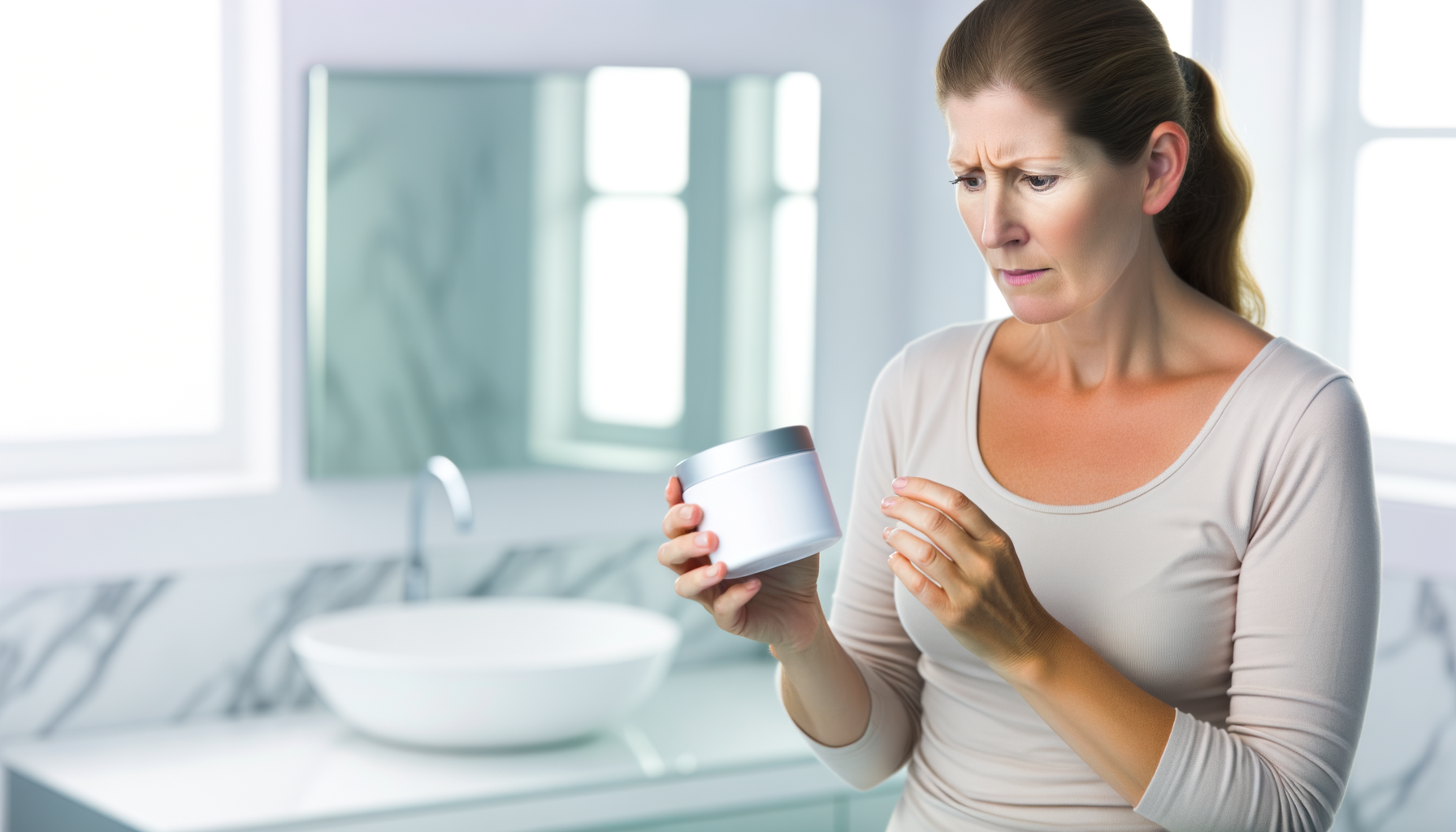Menopause marks a significant transition in a woman’s life, characterized by the end of menstrual cycles and a decline in reproductive hormones. It is during this time that many women experience a variety of symptoms, one of which can be lightheadedness. Lightheadedness during menopause is a sensation of feeling faint or on the verge of passing out, without the room spinning around them. It is a form of dizziness that can be brief and unexpected, causing concern even after the sensation has passed. The causes of lightheadedness in menopause are multifaceted, often linked to hormonal fluctuations that affect blood pressure, hydration levels, and even blood sugar regulation.
Differentiating Lightheadedness from Dizziness
While the terms lightheadedness and dizziness are frequently used interchangeably, they describe different sensations. Dizziness encompasses a range of sensations including vertigo, which is the feeling that you or your surroundings are spinning, and disequilibrium, a loss of balance or unsteadiness. Lightheadedness, on the other hand, specifically refers to a feeling of faintness or near-fainting. It is important to distinguish between these sensations, as they can have different implications and may point to various underlying causes.
Overview of Symptoms and Concerns
The experience of lightheadedness during menopause can be accompanied by other symptoms such as palpitations, sweating, or nausea. These symptoms can be alarming and may significantly impact daily life. It is not uncommon for menopausal women to report feeling lightheaded when standing up too quickly or after experiencing a hot flash. While occasional lightheadedness may not be a cause for alarm, persistent or severe episodes warrant medical attention. Understanding the range of symptoms and when they may be a sign of a more serious condition is crucial for managing health during menopause.
Recognizing the symptoms and concerns associated with lightheadedness during menopause is the first step towards addressing this lesser-known but impactful symptom. As we delve deeper into the causes and management strategies in the following sections, it becomes clear that while menopause is a natural stage of life, the symptoms it brings, including lightheadedness, are not something women have to endure without support and care.
Causes of Lightheadedness During Menopause
One of the common causes of lightheadedness during menopause is orthostatic hypotension, a form of low blood pressure that happens when you stand up from sitting or lying down. This can cause a feeling of lightheadedness or even fainting. Blood pressure variations during menopause can be attributed to hormonal changes which affect the cardiovascular system. These fluctuations can lead to inconsistent blood flow and oxygen delivery to the brain, resulting in transient lightheadedness.
Dehydration and Nutritional Factors
Dehydration is another significant factor that can cause lightheadedness during menopause. With hormonal changes, the body’s ability to retain water may be compromised, leading to dehydration if fluid intake is not increased. Additionally, nutritional factors play a role; for instance, low levels of certain nutrients like vitamin B12, iron, or folate can lead to anemia, which is often associated with lightheadedness.
Medication Side Effects and Other Health Conditions
Medications taken for menopause symptoms or other health conditions can have side effects that include lightheadedness. It’s important to review any current medications with a healthcare provider to determine if they could be contributing to the issue. Other health conditions, such as thyroid disorders or ear infections, can also manifest as lightheadedness during menopause.
Hormonal Fluctuations and Their Impact
The hormonal fluctuations that characterize menopause can have a direct impact on the sensation of lightheadedness. Estrogen and progesterone, which see significant changes during menopause, are not only crucial for reproductive health but also play roles in the regulation of other bodily functions, including the maintenance of blood vessels and blood flow. As these hormone levels decline, women may experience episodes of lightheadedness as a result.
In conclusion, lightheadedness during menopause can be caused by a variety of factors, including orthostatic hypotension, dehydration, nutritional deficiencies, medication side effects, other health conditions, and hormonal fluctuations. Understanding these causes is the first step in managing this symptom effectively.
Hormonal Changes and Their Effects on Balance
The hormones estrogen and progesterone play a significant role in the overall health of individuals with ovaries, extending beyond their well-known functions in the reproductive system. These hormones also influence the functioning of other organs, including the brain and the inner ear, which are critical for maintaining balance. During perimenopause, the ovaries begin to produce less estrogen and progesterone, leading to fluctuations that can affect balance. Estrogen, in particular, helps regulate the metabolism, which includes the process of converting food into glucose for energy. As estrogen levels fluctuate, this can lead to variations in blood glucose levels, potentially causing fatigue and dizziness. Additionally, estrogen influences the cardiovascular system, and changes in its levels can result in palpitations or an irregular heartbeat, which may contribute to feelings of lightheadedness or dizziness.
Inner Ear Changes and Balance Issues
The inner ear contains the otoconia, an organ comprising tiny crystals called otoliths, which are essential for sensing balance. Hormonal changes during menopause may weaken the otoconia, leading to conditions such as benign paroxysmal positional vertigo (BPPV), where a person experiences dizziness with movement or changes in position. Research suggests a link between estrogen loss and a weakening of the otoconia, indicating that hormonal fluctuations might contribute to ear-related dizziness. Furthermore, aging, which often coincides with menopause, can also affect the inner ear’s function, exacerbating balance issues.
Fatigue, Sleep Deprivation, and Brain Fog
Menopause is frequently associated with sleep disturbances, such as insomnia and non-restorative sleep, which can lead to fatigue and dizziness during the day. The lack of quality sleep may also result in brain fog, a term used to describe cognitive difficulties such as memory problems and a lack of mental clarity. These issues, combined with the direct effects of hormonal changes on the brain, can impair one’s ability to maintain balance and contribute to a heightened risk of falls and injuries. Managing sleep hygiene and addressing sleep-related disorders are crucial steps in mitigating these symptoms and improving balance.

Bette 100% All-Natural Relaxing Lavender Body Lotion.
Chemical-Free
Your relaxing night time body moisturizer to leave the day’s stress behind. Decompress and wish your body good night with the calming scent of lavender.
Natural Management of Lightheadedness
Adopting healthier lifestyle habits can significantly improve balance and reduce the occurrence of lightheadedness during menopause. Regular physical activity is paramount, as it enhances blood circulation, balance, and coordination. Incorporating exercises such as walking, yoga, or tai chi can help stabilize blood pressure and improve overall stability. Additionally, stress management techniques like deep breathing, meditation, and mindfulness can reduce the impact of stress on the body, which is often a contributor to lightheadedness.
Dietary Recommendations and Hydration
Maintaining a balanced diet and staying hydrated are essential strategies in managing lightheadedness. A diet rich in whole grains, lean proteins, fruits, vegetables, and healthy fats provides the necessary nutrients for optimal body function. It’s crucial to avoid skipping meals to prevent blood sugar fluctuations that can lead to lightheadedness. Hydration is equally important; drinking plenty of water throughout the day helps maintain blood volume and circulation, preventing low blood pressure, a common cause of lightheadedness.
- Limit caffeine and alcohol: These can lead to dehydration and blood pressure fluctuations.
- Reduce salt intake: Excessive sodium can increase blood pressure.
- Choose complex carbohydrates: Foods like brown rice and quinoa help maintain steady blood sugar levels.
Sleep Hygiene and Its Importance
Quality sleep is vital for managing menopausal symptoms, including lightheadedness. Establishing a consistent sleep schedule, creating a comfortable sleep environment, and practicing good sleep hygiene can reduce fatigue and stress, lowering the risk of lightheadedness episodes. Avoid stimulants such as caffeine close to bedtime and establish a relaxing pre-sleep routine to enhance sleep quality.
Medication Review and Consultation with Healthcare Providers
Medications can sometimes contribute to lightheadedness. It’s important to review all current medications with a healthcare provider to identify any potential side effects or interactions that may cause or worsen lightheadedness. A healthcare provider can also offer guidance on appropriate supplements, such as magnesium or vitamin D, which support neuromuscular function and may help prevent dizziness. If lightheadedness persists or worsens, it is crucial to seek medical advice to rule out other underlying conditions.
In conclusion, managing lightheadedness naturally involves a multifaceted approach that includes lifestyle modifications, dietary changes, sleep hygiene, and medication review. By implementing these strategies, individuals going through menopause can alleviate lightheadedness and improve their overall well-being.
When to Seek Medical Attention
While lightheadedness can be a common symptom during menopause, certain instances warrant immediate medical attention. It’s crucial to recognize when lightheadedness is not just a nuisance but a potential sign of a more serious underlying condition. If you experience lightheadedness accompanied by chest pain, blurred vision, severe headache, loss of consciousness, difficulty breathing, sudden weakness, or numbness, especially on one side of the body, these could be signs of a cardiovascular event, stroke, or other significant health issues. In such cases, seek emergency medical care without delay.
Understanding When Lightheadedness Is a Red Flag
Lightheadedness becomes a red flag when it is recurrent, severe, or associated with other concerning symptoms. If you notice that your episodes of lightheadedness are increasing in frequency, intensity, or duration, it’s time to consult a healthcare professional. Additionally, if lightheadedness causes you to faint or fall, leading to potential injuries, this is a clear indication that medical evaluation is necessary. Pay attention to patterns that may trigger these episodes, such as changes in position, exertion, or during hot flashes, as these details can help your healthcare provider determine the cause.
Consulting Healthcare Professionals
When lightheadedness interferes with your daily activities or causes concern, schedule an appointment with your healthcare provider. Be prepared to describe the sensation accurately, as “lightheadedness” can mean different things to different people. It’s helpful to keep a symptom journal detailing when the lightheadedness occurs, its duration, associated activities, and any other symptoms you experience. Your healthcare provider may perform tests to check your blood pressure and heart rate in various positions and may inquire about your ear health, as inner ear issues can affect balance. Depending on their findings, they may refer you to a specialist, such as a cardiologist, neurologist, or otolaryngologist (ENT), for further evaluation.
Remember, while menopause is a natural phase of life, it doesn’t mean you have to navigate its symptoms alone. Healthcare professionals can offer guidance, support, and treatment options to help manage lightheadedness and other menopausal symptoms effectively.
Preventive Measures and Safety Tips
Lightheadedness during menopause can lead to fainting and injuries, which is why it’s important to implement strategies to mitigate these risks. Here are some tips:
- Stay Hydrated: Dehydration can exacerbate lightheadedness. Ensure you drink plenty of fluids throughout the day, especially water.
- Eat Regularly: Consuming small, frequent meals can help maintain stable blood sugar levels, reducing the risk of lightheaded episodes.
- Move Slowly: When getting up from sitting or lying down, do so gradually to prevent a sudden drop in blood pressure that can cause fainting.
- Use Support: When feeling unsteady, use a cane or hold onto stable furniture to maintain balance.
- Monitor Symptoms: Keep a diary of when lightheadedness occurs to identify patterns and potential triggers.
Safety Precautions for Daily Activities
During menopause, daily activities may need to be adjusted to ensure safety:
- Home Safety: Remove tripping hazards, install grab bars in the bathroom, and ensure good lighting throughout your home.
- Footwear: Wear shoes with good support and non-slip soles to prevent falls.
- Driving: If you experience lightheadedness frequently, consider limiting or avoiding driving and seek alternative transportation.
- Rest: Take breaks as needed during activities to prevent overexertion, which can lead to lightheadedness.
Emergency Response Planning
Having a plan in place for emergencies is crucial:
- Medical Alert System: Consider wearing a medical alert bracelet or investing in a home alert system, especially if you live alone.
- Emergency Contacts: Keep a list of emergency contacts easily accessible, including family, friends, and healthcare providers.
- Inform Others: Let family and friends know about your condition so they can check in on you regularly.
- First Aid Knowledge: Learn basic first aid and CPR, or ensure someone close to you knows these lifesaving techniques.
By taking these preventive measures and safety tips into account, you can navigate menopause-related lightheadedness with greater confidence and security.

Conclusion: Living with Menopause-Related Lightheadedness
Throughout this article, we have explored the multifaceted relationship between menopause and lightheadedness. It is clear that menopause can trigger lightheadedness in many women, with symptoms ranging from mild to severe. The causes are diverse, including orthostatic hypotension, dehydration, medication side effects, and hormonal fluctuations. Particularly, the role of estrogen and progesterone in maintaining balance is significant, as their levels drop during menopause, potentially leading to inner ear changes and balance issues.
Encouraging Self-Awareness and Proactive Health Management
Managing menopause-related lightheadedness involves self-awareness and proactive health management. Women are encouraged to monitor their symptoms closely and recognize patterns that may indicate triggers. Adopting healthy lifestyle habits, such as a balanced diet, adequate hydration, and regular sleep, can mitigate some of the lightheadedness experienced during menopause. Additionally, regular consultations with healthcare providers are crucial for monitoring health changes and adjusting medications as necessary.
Final Thoughts on Navigating Menopause Symptoms
Navigating the symptoms of menopause, including lightheadedness, requires a comprehensive approach that addresses both the physical and emotional aspects of this transition. Women should be encouraged to seek support from peers, healthcare professionals, and possibly support groups. It is also important to educate oneself about menopause and its symptoms to better understand and cope with the changes occurring in the body. With the right strategies and support, women can manage lightheadedness effectively and maintain a good quality of life during menopause.
- Recognize the signs of lightheadedness and differentiate them from other symptoms.
- Stay hydrated and maintain a balanced diet rich in essential nutrients.
- Review medications with healthcare providers to ensure they are not contributing to lightheadedness.
- Engage in regular physical activity to improve overall balance and health.
- Consult healthcare professionals promptly if symptoms persist or worsen.
In conclusion, while menopause-related lightheadedness can be challenging, it is manageable with the right knowledge and approach. By understanding the causes, adopting healthy habits, and seeking medical advice when necessary, women can navigate this natural phase of life with confidence and ease.


















